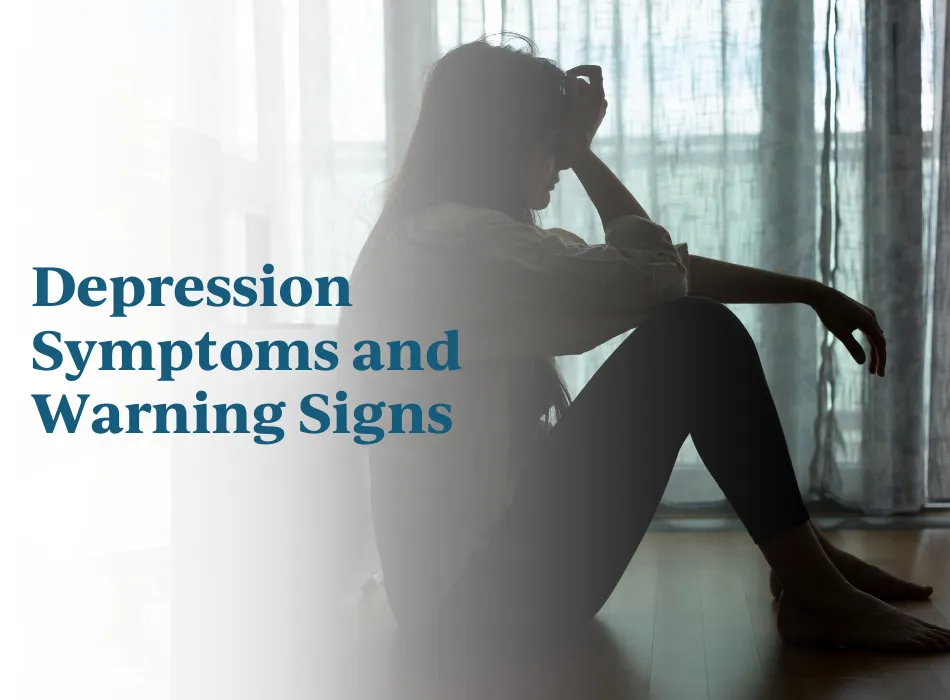
Depression Symptoms and Warning Signs
-
By John Burke
-
April 11, 2024
Depression is a common but severe mood disorder that affects millions of people globally. According to the World Health Organization (WHO), about 280 million people struggle with depression worldwide. While it’s perfectly normal to feel sad every so often, depression is much more than just feeling unhappy.
In this blog post, we’ll explore what depression is, the common signs and symptoms of depression, and treatment options to consider if you suspect you or a loved one is battling with depression.
What Is Depression?
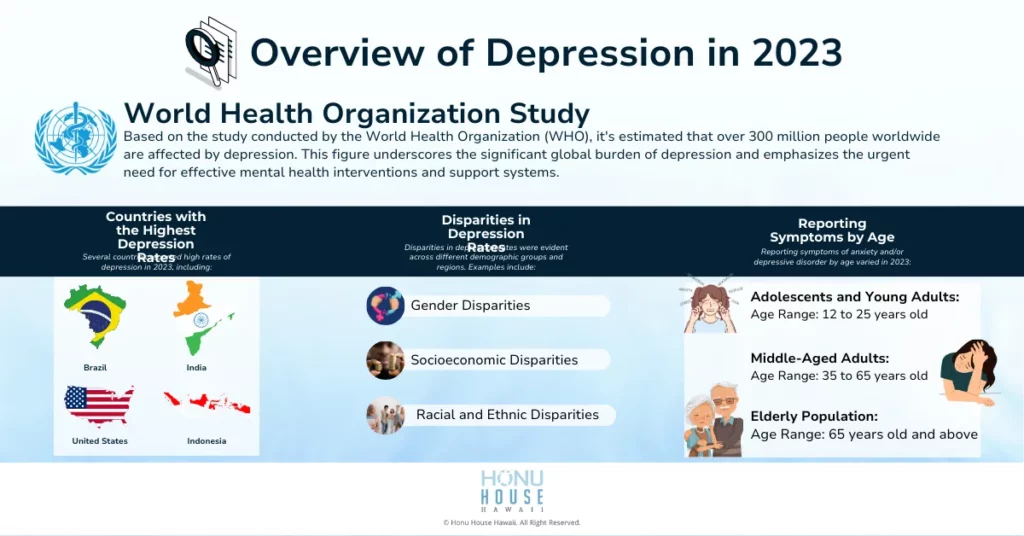
Depression (also known as major depressive disorder or clinical depression) is a mood disorder characterized by a persistent feeling of sadness, hopelessness, and loss of interest in activities previously enjoyed. It can affect how one thinks, feels, and behaves, resulting in various emotional and mental issues.
In the United States alone, an estimated 21 million adults experienced at least one major depressive episode in 2021, which is just under one out of ten of the adult population. These statistics demonstrate that depression is more common than most people think. As a result, it’s essential to be aware of the signs and symptoms of depression.
Common Signs and Symptoms of Depression
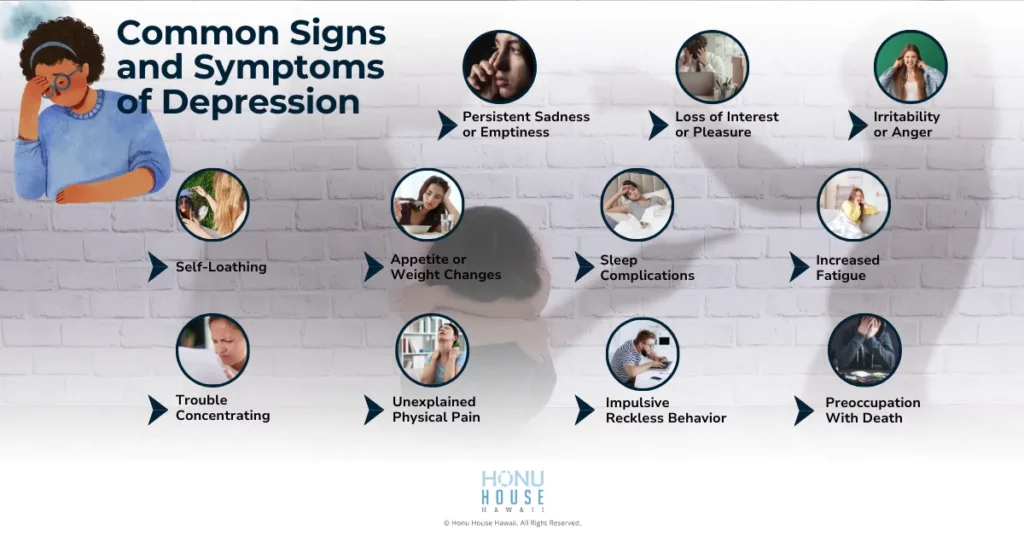
Depression can manifest in various ways, but there are some common signs and symptoms. If you suspect that you or a loved one is struggling with depression, here are some warning signs to look out for:
Persistent Sadness or Emptiness
This is a hallmark sign of depression. It’s often characterized by a continuous feeling of sadness, despair, or emptiness that doesn’t go away.
Loss of Interest or Pleasure
Depression can make activities that an individual once enjoyed unenjoyable or feel like a chore. This can encompass hobbies, social interactions, or even sex.
Irritability or Anger
While sadness is often associated with depression, some people experience irritability, anger, or even frustration — especially men.
Self-Loathing
People struggling with depression often experience intense feelings of worthlessness or guilt. They may frequently fixate on past failures or blame themselves for things beyond their control. They may often think, ”I’m not good enough,” or ”I’m never going to get better.”
Appetite or Weight Changes
Depression can lead to significant changes in appetite. Some people may binge eat, especially junk food, and gain weight. On the other hand, other people may eat considerably less and lose weight.
Sleep Complications
Depression can lead to sleep problems like insomnia (difficulty sleeping) or hypersomnia (sleeping too much).
Increased Fatigue
Many people struggling with depression often experience chronic fatigue due to their erratic sleep patterns and struggle to complete simple tasks or take more time than usual to complete them.
Trouble Concentrating
It’s perfectly normal to experience trouble concentrating sometimes. However, people living with depression often experience extreme difficulty focusing, remembering things, or making simple decisions.
Unexplained Physical Pain
Besides taking a toll on mental health, depression can also affect one’s physical well-being. Common physical pains associated with depression include headaches, stomachaches, joint aches, back pain, or cramps, which don’t go away with treatment.
Impulsive Reckless Behavior
Some people battling with depression may engage in risky activities such as substance abuse, reckless driving, or compulsive gambling. This sign of depression is more common among men than women.
Preoccupation With Death
Some individuals suffering from depression often experience frequent thoughts of death or suicide. They may often feel like life isn’t worth living and think, ”What’s the point?”
Depression in Teens
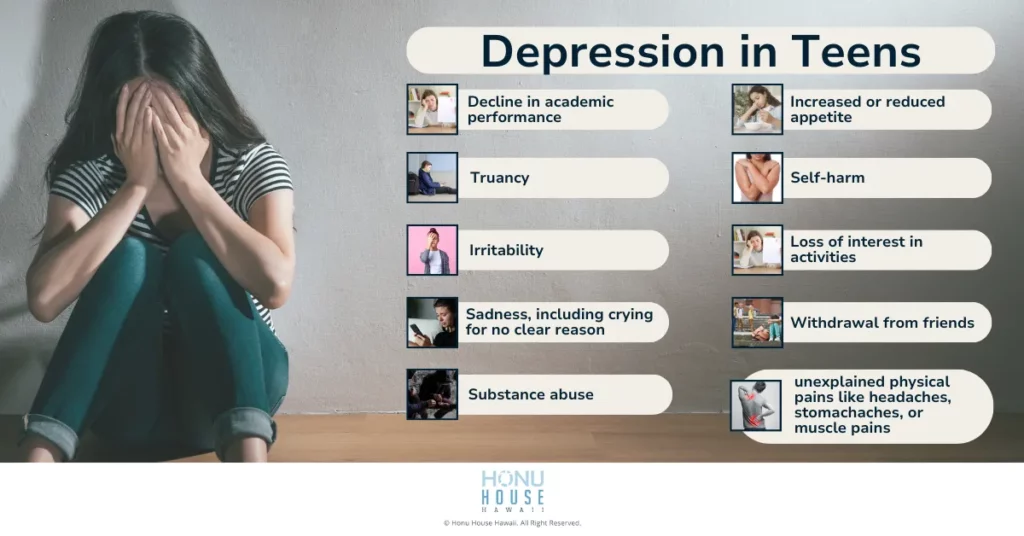
While the main signs and symptoms of depression are common across age groups, teens may exhibit some variations. Here are some common warning signs to watch for:
- Decline in academic performance
- Truancy
- Irritability
- Sadness, including crying for no clear reason
- Substance abuse
- Increased or reduced appetite
- Self-harm
- Loss of interest in activities
- Withdrawal from friends
- Unexplained physical pains like headaches, stomachaches, or muscle pains
If you’re a parent or caregiver living with a teenager, be mindful of these signs and encourage open communication.
Depression in Seniors
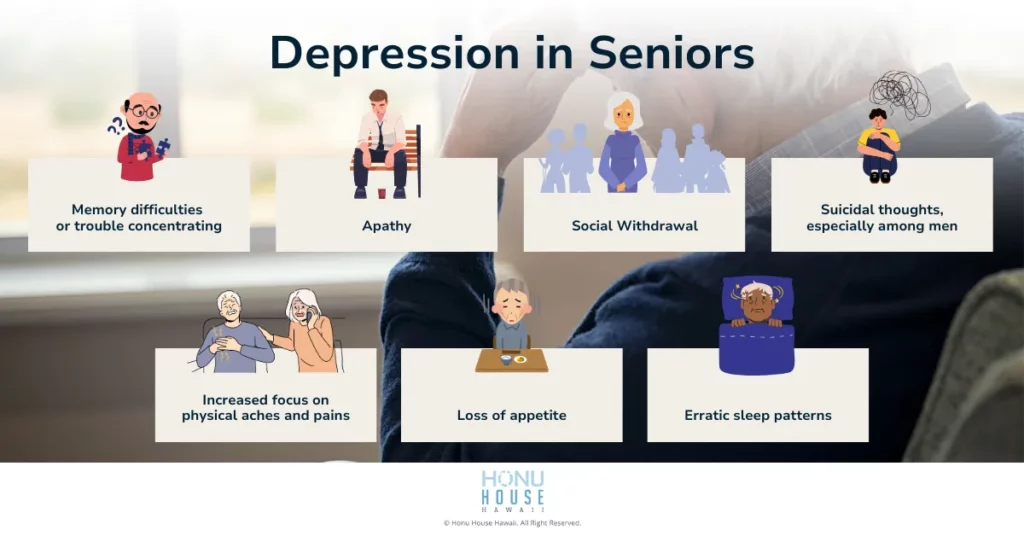
Detecting depression in older adults can be trickier, as some symptoms may overlap with physical health complications or the natural aging process. Here are some common signs to watch for:
- Memory difficulties or trouble concentrating
- Apathy
- Social withdrawal
- Increased focus on physical aches and pains
- Loss of appetite
- Erratic sleep patterns
- Suicidal thoughts, especially among men
Seeking Treatment for Depression
If you or a loved one is experiencing the above signs and symptoms of depression, there’s hope. Depression is a treatable condition, and with the right support, individuals can feel better and regain control of their lives.
Generally, the first step is to reach out to a mental health professional. This could be a counselor, psychologist, or psychiatrist. They can conduct a thorough evaluation to diagnose depression and develop a personalized treatment plan.
While there’s no one-size-fits-all treatment for depression since it affects people differently, here are some common approaches used to treat it:
Psychotherapy
Psychotherapy, also known as talk therapy or counseling, can help people living with depression change their behaviors and foster new ways of thinking to treat depression.
Some common psychotherapies used to treat depression include interpersonal therapy (IPT) and cognitive behavioral therapy (CBT). The latter is a popular approach that helps individuals identify negative thought patterns and equips them with coping mechanisms for dealing with difficult emotions and situations.
Meanwhile, IPT focuses on helping people improve their communication skills and relationships, which can be especially beneficial for individuals who withdraw from social interactions.
Lifestyle Changes
While psychotherapy is often an essential part of depression treatment, lifestyle changes can enhance the recovery journey. Here are some simple lifestyle changes to treat depression:
- Exercise: Regular exercise can improve mood and overall well-being by triggering the release of feel-good brain chemicals like dopamine, serotonin, and endorphins.
- Adequate sleep: Sleep has a significant impact on mood. Sleep deprivation can cause chemical imbalances in the brain, leading to issues such as increased irritability, anger, and sadness.
- Eating a balanced diet: A nutritious diet can improve physical and mental well-being. One study found that people who consume a nutritious diet rich in vegetables and fruits report lower levels of depression and greater happiness.
- Stress reduction: Stress reduction techniques, such as mindful meditation and journaling, can reduce stress and minimize the risk of depression.
Medication
Antidepressants are prescription meds used to treat depression. They regulate the levels of certain brain chemicals associated with mood regulation, like serotonin, dopamine, and oxytocin. Generally, antidepressants take about four to eight weeks to alleviate depression symptoms, so it’s best to give them time to work.
However, while antidepressants may relieve some of the symptoms associated with depression, they usually don’t treat the underlying problem, so they aren’t an ideal long-term solution. Additionally, some antidepressants may have side effects, and they can interact with other medications.
Therefore, make sure you consult your healthcare provider before you or your loved one starts taking antidepressants. Also, if you or a loved one starts taking antidepressants, don’t abruptly stop taking them, as doing so can result in adverse withdrawal symptoms.
Counseling for Depression Near Me
Depression is a mental illness. It isn’t a sign of weakness. With proper diagnosis, effective treatment, and a strong support system, depression is a condition anyone can overcome and live a life filled with purpose, happiness, and productivity.
If you or a loved one is struggling with depression, don’t fight the battle alone. At Honu House, we offer comprehensive depression treatment in Hawaii, incorporating individual therapy, alternative therapy, and peer-support groups.
Don’t wait any longer to seek treatment. Contact us today to speak to one of our experienced mental health professionals about the challenges you’ve been facing and start your journey toward wellness.
FAQs
Is Wanting to Be Alone a Sign of Depression?
While wanting to be alone is perfectly normal, complete withdrawal from friends, family, and others could be a symptom of depression. If you constantly avoid social interaction and prefer solitude even when you crave connection, consider other symptoms you might be experiencing.
What Are Some Signs and Symptoms of Depression in Teens?
Teens with depression might exhibit some signs that differ from adults. Watch out for a decline in academic performance, truancy, irritability, self-harm, and substance abuse. Also, look for sudden withdrawal from friend groups and excessive social media use.
Is Anger a Symptom of Depression?
While depression is often associated with sadness, it can sometimes manifest as anger — especially among men. This anger may be directed at oneself or others and can arise from feelings of hopelessness, helplessness, or frustration.
How Can I Help My Depressed Spouse?
Supporting a spouse struggling with depression requires patience and understanding. Some great ways you can support your spouse include educating yourself about depression, communicating openly without judgment, and encouraging your spouse to seek professional help. You can also support your spouse by caring for yourself and offering encouragement along the path to healing.
Why Does Depression Make You Tired?
Depression can disrupt your sleep patterns and affect your energy levels in various ways. Sleep complications like insomnia or hypersomnia can affect sleep quality, resulting in chronic exhaustion. Additionally, depression can affect motivation and make simple tasks feel overwhelming, leading to fatigue.
